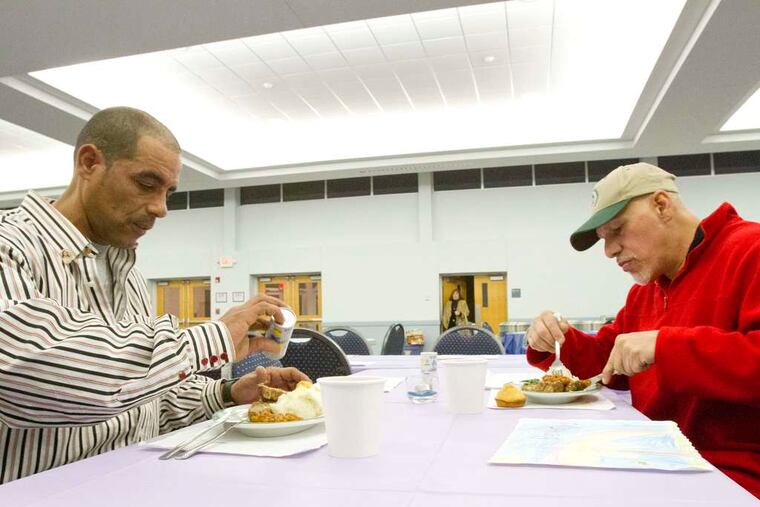Network of congregations helps homeless men
After spending two years on the streets in Camden, addicted to crack and heroin and sleeping in an abandoned car, Robert O'Neal found shelter and sobriety - in a series of suburban South Jersey congregations.

After spending two years on the streets in Camden, addicted to crack and heroin and sleeping in an abandoned car, Robert O'Neal found shelter and sobriety - in a series of suburban South Jersey congregations.
"Their love for the men in the program is genuine," O'Neal, 45, said of the volunteers at the Homeless Hospitality Network, which has more than two dozen member congregations in Cherry Hill, Collingswood, Haddonfield, Haddon Heights, Blackwood, Lawnside, Oaklyn, and other communities.
The program, run by the nonprofit Interfaith Homeless Outreach Council, houses up to 12 homeless men at a time for six months each winter, with a different congregation hosting the men every two weeks.
But it provides more than shelter. During the first 10 weeks of the program, volunteers prepare the men for job searching, providing help with resumés and classes in computer skills.
They also get substance-abuse counseling. Participation in Alcoholics Anonymous is required, and so is compliance: The men are randomly drug tested, and anyone caught using is kicked out.
For O'Neal, who began the program in November 2009, the structure and support were "what I needed." He said he had stayed clean since.
He is struggling to find work, however. And while he considers his sobriety a blessing, not all of the men in the program achieve it: Of 15 accepted into the program this winter, seven remain.
"We kind of expect about half of them to go back," said Sonya Jacobs, case manager for the council, who recruits and interviews men at an office at the PATH Day Center in North Camden.
"Relapse is a part of recovery," Jacobs said. Some men may not be ready: "They've got to see the necessity to make a change."
The program wasn't always so comprehensive. It began 20 years ago after the Camden County Board of Freeholders appointed an advocate to examine the availability of services for the homeless.
The advocate decided that homeless men were most in need of shelter and recommended an approach other communities had taken, hosting the men on a rotating basis, said Ruth Morgenroth, the council's acting executive director.
About eight congregations - including Cherry Hill's M'kor Shalom - took part in a pilot program, and the next year, the outreach council came into being, Morgenroth said.
The number of congregations involved in the effort - which relies on state and federal assistance and private contributions - has since grown to 28, with 15 hosting the men in their buildings.
The mission, meanwhile, evolved with the hiring of Jacobs. The nonprofit's full-time employee, she joined the program 13 years ago and quickly realized that the men she helped land work were using the paychecks to support drug habits.
"In two weeks, when payday came, of the 12, I had four," Jacobs said. She informed the council's board of the situation, and since then the program has incorporated substance-abuse counseling.
"They just wanted me to find men and find them jobs," Jacobs said. But "they're homeless for a reason."
While the program isn't a treatment facility, she said, "in order to be effective, we had to offer some things that would get to the root of the problem."
Eight of the men who began the program this winter were heroin addicts, according to one of them.
"We broke the habit here, without medication," said the man, who asked to be identified only by his nickname, Nacho, and said he had been a heroin addict for more than 25 years. "We had these good people who watched over us."
He was sitting at a table Jan. 21 in the parish hall at St. Mary's Catholic Church on Springdale Road in Cherry Hill. Other men filtered into the hall, having recently returned from a day of job-searching.
After the first 10 weeks of the program - during which they are bused daily to the council's halfway house in Lawnside - the men are given bus passes and prepaid cellphones to help them look for work.
Given the job market, the men are advised to contact temporary agencies, Morgenroth said.
They also get help tracking down needed documents; volunteers helped Nacho get his Social Security card and birth certificate.
"They make you feel like family," he said.
Nearby, volunteers Bill Schulze and Helen Meyers, both St. Mary's members, were preparing for dinner: lasagna, veal, salad, and bread, all donated.
Rickie Cohen, a longtime volunteer from M'kor Shalom, arrived, and the volunteers and men formed a circle, holding hands as they recited the Serenity Prayer and another popularized among the group by Cohen: "Good bread, good meat, good God, let's eat."
One man, who asked to be identified as Azariah - a Hebrew name he took on two weeks ago - donned an apron and began dishing out squares of lasagna. A builder by trade, he enjoys being in the kitchen and dreams of working as a chef.
His previous attempts to stay sober have failed, but the volunteers have given him new confidence, he said: "They literally loved me back to life."
at 856-779-3232 or mhanna@phillynews.com.